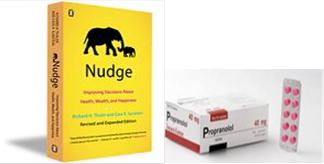Awareness of a Nudge is not Required for Resistance of a Nudge
Written by Gabriel De Marco and Thomas Douglas
This blog post is based on our forthcoming paper: “Nudge Transparency is not Required for Nudge Resistibility,” Ergo.
Consider the following cases:
Food Placement. In order to encourage healthy eating, cafeteria staff place healthy food options at eye-level, whereas unhealthy options are placed lower down. Diners are more likely to pick healthy foods and less likely to pick unhealthy foods than they would have been had foods instead been distributed randomly.
Default Registration. In application forms for a driver’s license, applicants are asked whether they wish to be included in the organ donation registry. In order to opt out, one needs to tick a box; otherwise, the applicant will be registered as an organ donor. The form was designed in this way in order to recruit more organ donors; applicants are more likely to be registered than they would have been had the default been not being included in the registry.
Interventions like these two are often called nudges. Though many agree that it is, at least sometimes ethically OK to nudge people, there is a thriving debate about when, exactly, it is OK.
Some authors have suggested that nudging is ethically acceptable only when (or because) the nudge is easy to resist. But what does it take for a nudge to be easy to resist? Authors rarely give accounts of this, yet they often seem to assume what we call the Awareness Condition (AC):
AC: A nudge is easy to resist only if the agent can easily become aware of it.
We think AC is false. In our forthcoming paper, we mount a more developed argument for this, but in this blog post, we simply consider one counterexample to it, and one response to it.
Read More »Awareness of a Nudge is not Required for Resistance of a Nudge


